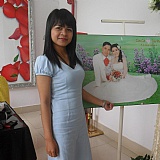Introduction
while you don't need to become fluent in Vietnamese, learning a few essential phrases can greatly enhance your travel experience, improve your safety, and foster positive interactions with the people you meet in Vietnam. It's a small effort that can make a big difference in how you experience and appreciate the country and its culture.
Vietnamese is a tonal language, so the intonation of a word can change its meaning. Pay attention to the tone marks provided for each word.
Greetings and Politeness:
- Hello: Xin chào (sin chow)
- Good morning: Chào buổi sáng (chow bwow-ee sang)
- Good afternoon: Chào buổi chiều (chow bwow-ee ch-yew)
- Good evening: Chào buổi tối (chow bwow-ee toy)
- How are you?: Bạn khỏe không? (buhn kweh kh-uhng?)
- I'm good: Tôi khỏe (toy kh-uh)
- Thank you: Cảm ơn (kahm uhn)
- Please: Xin vui lòng (sin voo-ee long)
- Yes: Vâng (vahng)
- No: Không (kh-uhng)
- Excuse me / Sorry: Xin lỗi (sin loy)
- Goodbye: Tạm biệt (tahm byet)
Basic Phrases:
- What is your name?: Bạn tên là gì? (buhn ten la gee?)
- My name is [Your Name]: Tôi tên là [Your Name] (toy ten la [Your Name])
- I don't understand: Tôi không hiểu (toy kh-uhng hye-oo)
- Can you help me?: Bạn có thể giúp tôi không? (buhn koh tê gi-uhp toy kh-uhng?)
- I need [something]: Tôi cần [something] (toy kuhn [something])
- How much is this?: Cái này bao nhiêu tiền? (kaai nay baow nyew tee-uhn?)
- Where is the restroom?: Nhà vệ sinh ở đâu? (nya veh sin uh daow?)
- I'm lost: Tôi bị lạc đường (toy bee lahk doo-uhng)
- Can you recommend a good restaurant?: Bạn có thể gợi ý một nhà hàng ngon không? (buhn koh tê gợi ih mût nya hahng nguhn kh-uhng?)
- Water: Nước (nwuhk)
- Food: Đồ ăn (doh uhn)
- Delicious: Ngon (nguhn)
- I'm a tourist: Tôi là khách du lịch (toy la kahch doo leek)
- Help!: Cứu (kew)
Numbers:
- 1: Một (moht)
- 2: Hai (hay)
- 3: Ba (bah)
- 4: Bốn (buhn)
- 5: Năm (nahm)
- 10: Mười (moo-ee)
- 100: Trăm (trahm)
- 1000: Nghìn (ngheen)
Directions:
- Left: Bên trái (buhn trai)
- Right: Bên phải (buhn fai)
- Straight ahead: Thẳng (tahng)
- North: Bắc (bahk)
- South: Nam (nahm)
- East: Đông (dohng)
- West: Tây (tay)
Shopping:
- How much does this cost?: Cái này bao nhiêu tiền? (kaai nay baow nyew tee-uhn?)
- Too expensive: Quá đắt (kwah daht)
- Can you lower the price?: Bạn có thể giảm giá không? (buhn koh tê zem zah kh-uhng?)
- I'll take it: Tôi sẽ mua nó (toy seel moo-uh naw)
- Do you accept credit cards?: Bạn có chấp nhận thẻ tín dụng không? (buhn koh chap nyen tê tin duwng kh-uhng?)
Emergencies:
- Help!: Cứu (kew)
- I need a doctor: Tôi cần gặp bác sĩ (toy kuhn gap bahk see)
- I've lost my passport: Tôi đã mất hộ chiếu (toy daa maht huh chee-ow)
- Call the police: Gọi cảnh sát (goy keng saht)
Remember to speak slowly and clearly, as pronunciation can be challenging in Vietnamese. Locals will appreciate your efforts to learn their language, even if it's just a few basic phrases.
When traveling to Vietnam, mastering common Vietnamese phrases can greatly enhance your experience, making it more authentic and enjoyable. To practice speaking these phrases effectively, engaging in conversation practice with a native speaker is invaluable. This approach not only helps in perfecting your pronunciation but also provides insight into the colloquial use of the language, something that textbooks often miss.
Conclusion
Not everyone you encounter in Vietnam, especially in rural areas, speaks English fluently. Having some basic phrases in Vietnamese can help you communicate your needs, ask for directions, and interact with locals. This can be especially crucial in situations where there are no English-speaking staff or guides available.
Learning a few local phrases also shows respect for the culture and people of Vietnam. It demonstrates that you have made an effort to understand and engage with their language. This can lead to more positive interactions and a warmer reception from locals. Traveling is not just about visiting places but also about experiencing the local culture. Understanding and speaking some Vietnamese can enrich your travel experience by allowing you to connect with locals on a deeper level, learn about their traditions, and gain insights that you might miss otherwise. Enjoy your trip to Vietnam!















